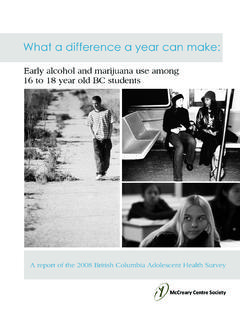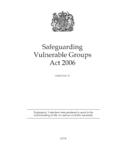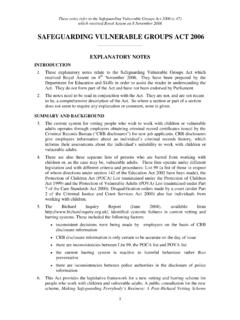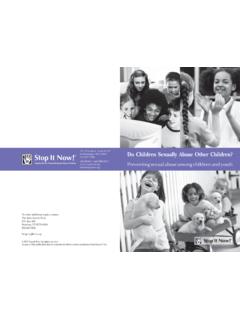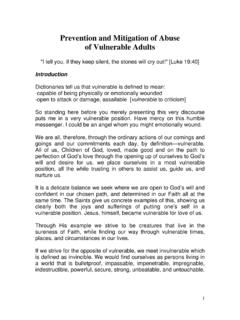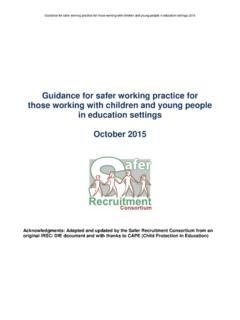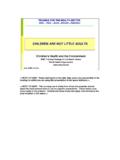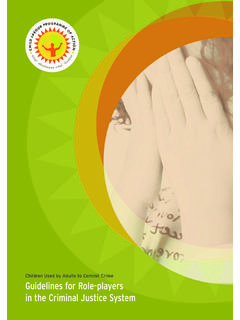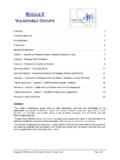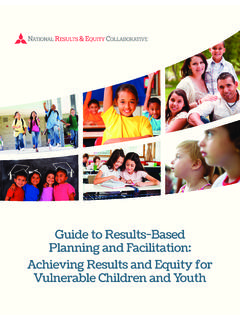Transcription of Building Resilience in Vulnerable Youth - McCreary Centre
1 Building Resilience inVulnerable YouthThe McCreary Centre Society Building Resilience in Vulnerable Youth McCreary Centre Society, 2006 ISBN 1-89543876-43552 Hastings Street East Vancouver, V5K 2A7 Tel: 604-291-1996 Fax: 604-291-7308 Email: Adolescent Health Survey is a project of The McCreary Centre Society, a non-government, non-profit organization committed to improving the health of Youth through research, education, and Youth leadership projects. Founded in 1977, the Society sponsors and promotes a wide range of activities and research to address unmet health needs of young people. Areas of interest include: Health promotion Health risk behaviours Youth participation and leadership skills developmentB u i l d i n g r e s i l i e n c e i n v u l n e r aB l e y o u t h Project teamAileen MurphyProject CoordinatorElizabeth SaewycResearch DirectorMinda ChittendenResearch AssociateNaren WangResearch AssociateAlison LiebelCommunications CoordinatorLisa MayCommunications ConsultantAcknowledgementsBuilding Resilience in Vulnerable Youth was funded by the British Co-lumbia Ministry of Children and Family Development.
2 The McCreary Centre Society acknowledges the support for the Adolescent Health Survey (AHS) III from the Province of British Co-lumbia, Ministry of Children and Family Development, Ministry of Health, Inter-Ministry Advisory Committee, AHS Project Advisory Committee, staff of participating school districts, and s public health views expressed in this report do not necessarily represent the official policy of the Prov-ince of British citationSaewyc, E., Wang, N., Chittenden, M., Murphy, A., & The Mc-Creary Centre Society (2006). Building Resilience in Vulnerable Youth . Vancouver, : The McCreary Centre Society. Building Resilience in Vulnerable Youth was written by Lisa May and designed by Alison Liebel. t h e M cc r e a r y c e n t r e s o c i e t y Table of ContentsIntroduction ..4 Key Findings.
3 6 About the Adolescent Health Survey ..7A Profile of Vulnerable Youth ..8 Who are our Vulnerable Youth ? ..8 Key outcomes ..10 Protective Factors Build Resilience ..16 Can protective factors offset risks and build capacity? ..16 Evaluating protective factors ..17 Results ..19 Conclusion & Recommendations ..24 School, family, and friends matter ..24 How can we help Vulnerable teens? ..25 McCreary Publications ..26B u i l d i n g r e s i l i e n c e i n v u l n e r aB l e y o u t h IntroductionMost adolescents in British Columbia navigate their teen years suc-cessfully. Surrounded by supportive families and communities, most Youth do well in school and avoid the negative experiences and risky behaviours that can lead to long-term health problems. These Youth have hope for the future and work hard to make their aspira-tions a reality.
4 Their dreams and plans include further education, meaningful careers, involvement in their communities, and warm relationships with family and friends. But some young people find the road to adulthood much harder to navigate and face more challenges than their peers. For these Youth , the journey is filled with obstacles and stressors that can derail healthy development, leaving them Vulnerable to poorer health and diminished achievement. Vulnerable Youth are at greater risk for not finishing school, experiencing homelessness, problem substance use, and other health-compromising behaviours. Their difficult life situations and disconnection from meaningful relationships can leave some Vulnerable Youth at risk for emotional distress and some even attempt Youth find the road to adulthood harder to navigate and face more challenges than their peersRisk and protective factors the risk factors these Youth face are associated with an increased likelihood of risky behaviours that are harmful to Youth health and develop-ment.
5 Conversely, protective factors promote healthy Youth development and reduce the risk of harmful behaviours. For example, research has shown that Youth who feel connected and safe at home with their family, at school, and in the community have better health, take fewer risks, and have higher edu-cational aspirations. In this report, we explore the experiences, risks and health challeng-es facing Vulnerable Youth in , and describe protective factors that offer hope for helping them build Resilience , connections and a positive h e M cc r e a r y c e n t r e s o c i e t y Patricia 25-year-old, two-time Ken Dryden Scholarship recipient, third-year undergraduate student Protective, positive relationships foster self-worthMy story started with childhood abuse and criminal neglect.
6 I was Vulnerable by all accounts, a prime candidate for long-term negative outcomes, yet somehow I emerged from childhood comparatively well equipped to be successful. I was not immune, however, to risky behaviour. I abused drugs, ran away, misused sex, and became convinced that suicide was my only way out. But behind the drugs and depression, the loneliness and isolation, I continued to struggle to define myself. This teenage quest to consolidate a stable self-concept created a critical period in which I was desperate for feedback. Then, at 15, an opportunity arose, and I eagerly became a representative and advocate for disadvan-taged Youth . I had never been successful in school, academically or socially, yet, in this circle, people listened when I spoke. That first opportunity led to another, and I began to incorporate concepts like articulate and bright into my self-concept.
7 I began to believe that it was worth the effort to protect my health, physically and emotionally. I continued down this path of Youth empowerment and advo-cacy, developing confidence and skills, travelling the globe, until I was no longer considered a Youth . The organizations that facilitated my growth (the McCreary Centre Society was a major one) and the relationships I developed with adults were a strong source of protection. Relationships with strong adult women gave me something to aspire to, helped me negotiate the convergence of my fragmented identity, and facilitated my positive self-image. Once I valued my own humanity, the opportunities for suc-cess opened up considerably. I am now a successful university student, wife and mother. I focus on encouraging the budding relationships between my children and myself, my partner and the community.
8 As my journey continues, I recog-nize the value and power of protective relationships in those around u i l d i n g r e s i l i e n c e i n v u l n e r aB l e y o u t h Positive relationships provide the most potent protective factors for Vulnerable teens Key Findings Having protective factors in Vulnerable teens lives can decrease the likelihood these Youth report negative behaviours and in-crease the chance they indicate positive attitudes and goals. The most potent protective factors for Vulnerable teens include positive relationships in key settings: Connectedness to people at school and in their families Having someone in their family they can talk to about prob-lems Having friends with healthy attitudes towards risky behav-iours Safety at school was another important protective factor: young people who do not feel safe and welcome at school do not do well in school and are less likely to develop supportive relation-ships to help them thrive.
9 Having parents present at key times in the day during the school week can also help reduce the odds of negative outcomes and foster positive opportunities for teens. Sharing the evening meal and being at home when teens go to bed showed positive ben-efits for Vulnerable Youth . t h e M cc r e a r y c e n t r e s o c i e t y About the Adolescent Health SurveyThe McCreary Centre Society conducted three province-wide Ado-lescent Health Surveys (AHS) to gather data on Youth health in , in 1992, 1998 and 2003. In total, over 72,000 students completed the surveys over a decade, providing information about trends among s Youth . And in 2003, more than 30,500 students in grades sev-en to 12 filled out a questionnaire. The fourth AHS will take place in people often establish lifelong attitudes and habits during adolescence, so survey questions were designed to identify factors that can influence present and future health.
10 For instance, questions were asked about health status, risk behaviours, family background, and feelings of connectedness with family and school to assess how these broader determinants of health affect Youth . McCreary staff focused on sample size and selection, confidential-ity, administration procedures, validity of responses, and data analy-sis to ensure the accuracy of the survey Resilience in Vulnerable Youth is based on the third AHS, and focuses on Vulnerable Youth who are attending school. McCreary has conducted additional studies to collect data on the health status of street Youth and young people in custody who are not enrolled or regularly attending school. No Place to Call Home: A Profile of Street Youth in British Columbia and Time Out II: A Profile of Youth in Custody can be downloaded from the McCreary website at In addition, McCreary is conducting another sur-vey of street Youth in the fall of Adolescent Health Surveys provide information about trends among s youthWant more information?

